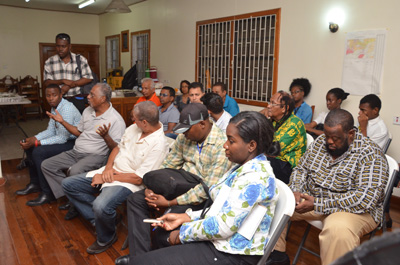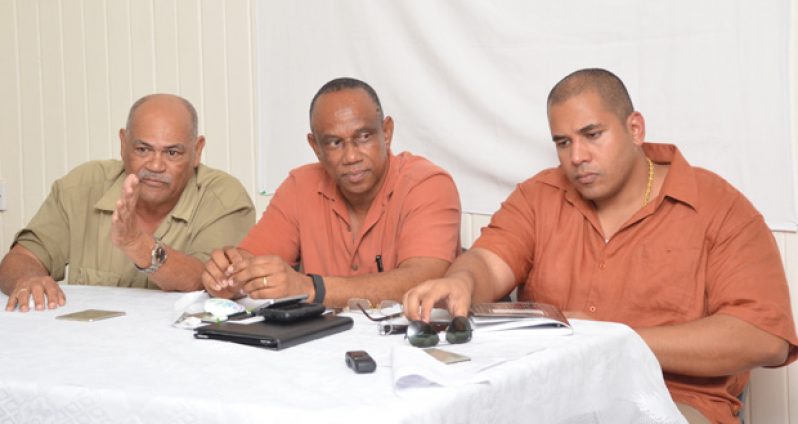MAJOR developments unfolding in the mining industry took a dramatic turn on Thursday when Chairman of the Guyana Geology and Commission (GGMC) Board of Directors Clinton Williams, abruptly ended a specially convened meeting in a reported attempt to avert a no-confidence motion.

Reports reaching the Guyana Chronicle indicate that the board during that early morning meeting had intended to pass a no-confidence motion against Williams. Williams found himself in hot water on Thursday after a report surfaced that he had reportedly spent a whopping $4 million on entertainment within 18 months.
Just two Mondays ago, the board under the stewardship of Williams passed a similar motion against the GGMC Commissioner Rickford Vieira and several senior functionaries.
On Tuesday, Vieira was sent on leave when he received a letter from Minister of Governance Raphael Trotman, indicating that he should proceed on leave. When contacted, Williams declined to comment on the matter, saying that he would address the issue at a later date.
Meanwhile, miners who were in attendance at the Guyana Gold and Diamond Miners Association (GGDMA) statutory meeting on Thursday afternoon pressed the leadership for answers.
“It seems as though there is chaos among the regulatory bodies,” one miner said as he solicited a response from GGMDA President Terrence Adams, Vice-President Andron Alphonso and Executive Secretary Tony Shields, who were seated at the head table.
In response, the GGDMA President disclosed that the board was summoned to a special meeting, but minutes after it started it was adjourned by the chairman without any explanation. The meeting was convened to address a number of issues, Adams told the miners.
In commenting on the matter, an upset Shields said Williams had no authority to adjourn the meeting.
“The chairman has no such authority… the chairman can move a motion to adjourn the meeting, but if several of the directors said no we are going ahead, he cannot adjourn it. The meeting has to be adjourned by the board,” he stated.
Nevertheless, the executive secretary informed the miners that the association has dispatched two letters to Minister Trotman, who has responsibility for GGMC, seeking clarification on a number of issues.
In the first letter dispatched to the Minister of Governance, the GGDMA questioned the board’s acceptance of Dr Grantley Walrond’s report.
“Dr Grantley Walrond was commissioned by Minister Robert Persaud and when he came out with the report, we wrote to Minister Robert Persaud, we put a two-three page letter in the press stating that we did not support the report based on three things. It was obviously biased, it was outside of the terms of reference and it dealt with personalities,” Shields said with no uncertainty.
LANDLORDISM
GGDMA remains firm on its position that the GGMC Management and Systems Review Inception Report, which was authored by Dr Walrond, L J L Heesterman and J Goolsarran was not only filled with inaccuracies, but seeks to reintroduce the concept of “landlordism”.
“We support a review of the systems of GGMC, we support the restructuring of GGMC, but we asked to be treated with respect,” Shields lamented.
Based on the GGDMA’s objection to the report, Shields said Minister Trotman had asked the association to submit 10 recommendations.
As part of the recommendations, he said the association is calling on government to launch a Commission of Inquiry (CoI) into the mining industry.
“Last year, the royalties paid by miners were $4.8 billion and we are asking the President to set up a Commission of Inquiry… with professional people along the same lines that with the sugar industry and the public service… you got to [do] this thing holistically.”
Findings from the Systems Management Review had influenced the board’s decision to move the no-confidence motion against Commissioner Vieira.
The exercise had commenced in December 2014 with the aim of reviewing the operations of the Mines Division, Land Management and Geological Services Divisions of the Commission to determine the coherence of the structures and functions and the flow of its operations. Additionally, it sought to identify systemic problems and other conflicts and deficiencies.
The team of consultants was also required to investigate whether the activities of the specific departments/divisions were aligned to the overall strategic plan for the sector.
It was argued that any deficiency within the management framework and current practices could contribute to the non-fulfilment of the commission’s objectives and could possibly lead to the presence or possibility of undesirable acts of malfeasance.



.jpg)









